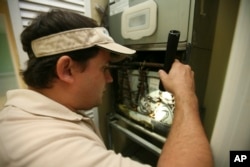Climate change has brought more frequent and extreme heat waves around the world.
This has led to strong demand for air conditioners and other cooling equipment. The demand for air conditioners is rising, with 10 new machines sold every second on average.
But a University of Oxford researcher warns that poor people may have to suffer through the rising heat.
By the year 2050, energy use for cooling is expected to be 300 percent higher than it is today. But in hot countries like India, China, Brazil and Indonesia, it is expected to grow by 500 percent, the World Bank has said.
Radhika Khosla leads an Oxford Martin School program on future cooling. She notes that, “By the end of the century, global energy demand for cooling will be more than it is for heating.”
But not everyone will have the money to buy an air conditioner.
Khosla said that, traditionally, “energy poverty has been defined as people not having heating.” Now that is changing and “we could have cooling poverty,” she warned.
She spoke to the Thompson Reuters Foundation at a conference on lowering planet-warming gases.
Health risks of heat waves
Rising heat is having a serious effect on health, with the number of deaths and people being admitted to hospitals going up during heat waves.
But rising heat could also affect productivity, as workers suffer in dangerously hot conditions, climate scientists say.
The United Nations provides financial support to an organization called Sustainable Energy for All, or SEforALL. A report from SEforALL says more than 1.1 billion people worldwide face immediate risks from lack of access to cooling.
On a warming planet, cooling is a necessity for everyday life, said the group’s leader, Rachel Kyte.
Better buildings
But because air conditioners use 20 times as much power as a traditional fan, their growing popularity could increase demand for electricity from fossils fuels, like oil and gas. And this would worsen climate change.
Instead of depending fully on air conditioning, buildings should be designed so they are easier to keep cool, which is still rare, Khosla noted.
Her modern home, for example, has windows that open just the width of a hand, making it hard to keep cool on hot days, she said.
She has herself lived in many hot cities from New Delhi to Chicago. And she predicted that in the future, housing that cannot stay cool or have air conditioning could see a drop in value, even in cooler areas.
New technology
In some developing nations with rising wages, buying an air conditioner is also a sign of success.
So, making less power-hungry, low cost air conditioners will be important, Khosla believes.
Most machines for sale now – the majority built in China – are half as energy-efficient as they could be, she said. But researchers are working on more efficient cooling technologies that could reach the market in as little as two years.
Judges are now looking at entries for a $3 million international cooling prize. The U.S.-based Rocky Mountain Institute launched the competition. The goal is to develop a less costly window air conditioning system that is at least five times more efficient than current models.
Amory Lovins is a co-founder of the institute. He said designing less costly, more efficient air conditioning is “extremely important.”
Getting manufacturers to speed up production will also be central to the goal, Khosla said. And this can be done partly by making policies that require greater energy efficiency.
Better cooling
Khosla said energy-efficient cooling systems are one tool we have left to avoid worsening climate change. And using less energy for cooling would help prevent power blackouts in cities on very hot days.
Cities also deal with the issue of the cooling systems releasing heat as they use energy, which can raise temperatures even more, Khosla said.
All these risks mean smarter cooling must happen quickly, before the world gets even hotter and more families buy air conditioners, she added.
I’m Alice Bryant.
Laurie Goering reported this story for the Thompson Reuters Foundation. Alice Bryant adapted it for Learning English. George Grow was the editor.
_______________________________________________________________
Words in This Story
frequent – adj. happening often
heat wave – n. a period of unusually hot weather.
access – n. a way of being able to use or get something
fan – n. a machine or device that is used to move the air and make people or things cooler
energy-efficient – adj. capable of reducing the amount of electrical energy needed to provide products and services
blackout – n. a period when lights are off because of an electrical power failure







